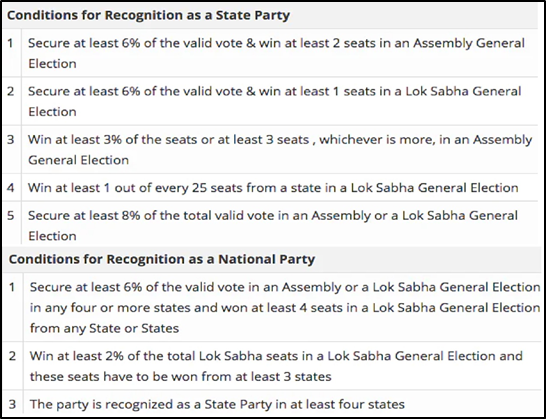In News:
- The Election Commission of India (ECI) recently delisted 111 more registered unrecognised political parties (RUPPs).
- These parties were discovered to be non-existent upon verification of their registered addresses.
- Furthermore, the ECI referred three parties allegedly involved in financial impropriety to the Department of Revenue, Ministry of Finance, for necessary legal and criminal action.
What’s in today’s article:
- Registration of political parties in India:
- Process
- Importance of registering with the ECI
- Deregistration of political parties
- News Summary
Registration of political parties in India:
Process
- Article 324 of the Indian Constitution grants the ECI the authority to register political parties.
- The registration of all political parties is governed by the provisions of Section 29A of the Representation of the People Act, 1951.
- According to the ECI, any party seeking registration must file an application (to the Secretary to the ECI) within 30 days of its formation.
- According to current guidelines:
- the applicant is required to publish a proposed party name in two national daily newspapers and two local daily newspapers,
- and provide two days for submitting objections, if any, with regard to the proposed registration of the party before the Commission within 30 days from the publication.
- The notice for publication is also available on the ECI's website.
Importance of registering with the ECI:
- Although, registration with the ECI is not mandatory, but such registration has advantages if the party intends to use the provisions of the RPA, 1951.
- Candidates nominated by a political party registered with the ECI will be given preference over purely independent candidates when it comes to the allocation of free symbols.
- Section 13 A of the Income-tax Act allows registered political parties to claim an income tax exemption on donations.
- More importantly, these registered political parties can eventually be recognised as a state or a national party if they meet the conditions outlined by the Commission in the Election Symbols (Reservation and Allotment) Order, 1968. For example,
- If a party is designated as a ‘state party,’ it is entitled to the exclusive use of its reserved symbol for candidates nominated in the state in which it is designated.
- If a party is recognised as a ‘national party’ it is entitled for exclusive allotment of its reserved symbol to the candidates set up by it throughout India.
- Recognized 'state' and 'national' parties require only one proposer to file a nomination and are entitled to two sets of electoral rolls free of charge as well as broadcast or telecast facilities over state-owned Akashvani or Doordarshan during general elections.

Deregistration of political parties:
- While the ECI has the power to register political parties under the RPA, 1951, it does not have the power to deregister parties that are inactive.
- The ECI can only delist the inactive parties and refer the matter to the Central Government for further action.
News Summary:
- A review of financial documents from some of the RUPPs that are publicly available reveals some glaring irregularities, such as
- Documents listing two different people as party president,
- The use of RUPPs as "shell companies" to "white-wash" black money while engaging in no or little political activity,
- Claiming tax exemptions without bothering to meet the statutory requirements of filing timely contribution reports and submitting annual audit reports.
- On this basis, the ECI shared a list of RUPPs that did not submit their contribution reports in FY 2017-18, 2018-19 and 2019-20, respectively, for requisite action under the RPA and the IT Act.
- A list of RUPPs which claimed IT exemption without submitting contribution reports has also been sent to the Revenue Department.
- Meanwhile, the ECI stated that the RUPP scrutiny and clean-up exercise that commenced recently will be thoroughly followed up on.










